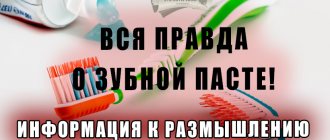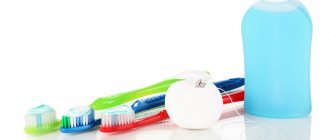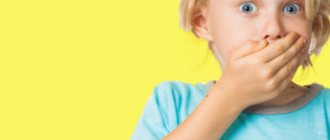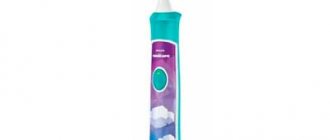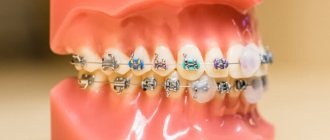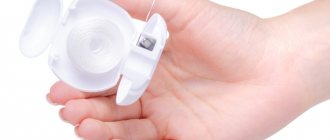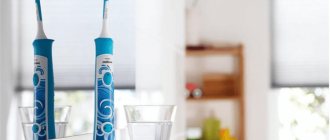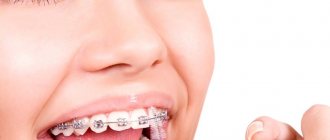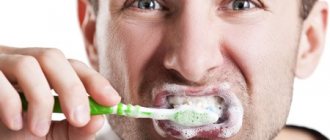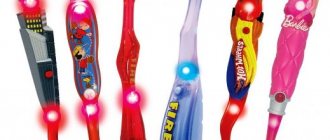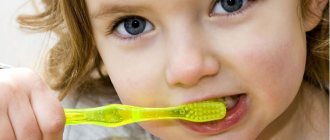What are the dangers of using adult toothpastes for children?
Inattention in this matter can result in serious consequences for the baby’s health.
Did you know that most children swallow toothpaste when brushing their teeth? And this has been proven by medical research!
That is why children's toothpaste should have a completely different
a composition that is safe not only for children’s enamel, but also for the baby’s health as a whole.
The delicate tooth enamel of children cannot tolerate pastes with a high abrasive content, so the first “bell” will be increased sensitivity.
Further, the teeth can be completely damaged.
Some experts advise children to use adult toothpaste as early as 6 years of age. This is not justified, because Tooth enamel is damaged by the harsh abrasives of adult toothpastes and the child will not like the taste of such toothpaste.
Proper education of dental hygiene in children also involves the use of correct (designed specifically for children) cosmetics.
Children's toothpaste must be chosen very carefully, so do not take the first one that catches your eye. The children's line of the President brand includes several products for different age categories.
Rules for storing and using the brush
| You should start brushing your baby's baby teeth as soon as the first ones appear. |
Baby teeth are not a temporary formation. This is an important element in the full development of the baby. They are responsible for the following aspects of development:
- formation of correct bite;
- jaw development;
- full functioning of the digestive tract;
- formation of a beautiful visual image of the baby.
If you do not pay proper attention to baby teeth, you can allow the development of many problems. Some of them will appear immediately, some as they grow older. And often parents do not suspect that the reason for their development is insufficient care of baby teeth.
At what age should a child brush his teeth? You shouldn’t wait for a certain age and look at the calendar; you need to start treating the oral cavity right from birth. Dental care is carried out immediately after their appearance. Cleansing procedures must be approached responsibly. The baby is not yet able to take care of his body. Parents must take on all these concerns.
The tongue, gums, mucous membranes of the lips and cheeks need to be cleansed of plaque from the first days of life. Breast milk and formula are a favorable environment for the proliferation of microorganisms. If plaque is not cleared in a timely manner, inflammatory processes develop in the oral cavity. Associated factors of stomatitis are:
- Decreased immunity.
- ARVI.
- Herpes infection.
- Fungal infection.
- Hypothermia of the body.
- Mucosal injury.
- Teething.
Inflammatory processes in the mouth bring suffering to the little man. The severity of the condition depends on the type of pathogen and the age of the patient. The baby's mood worsens, he becomes moody, and his body temperature rises. Signs indicating the presence of stomatitis: drooling, pain when eating, refusal to eat.
You should not use a cotton pad for procedures. It does not fit the structure, copes poorly with the task, and breaks into fibers upon contact with salivary fluid. They get stuck in the mouth and when they get on the root of the tongue, they cause a gag reflex.
Basic requirements for cleaning the oral mucous membranes of an infant:
- Cleanliness of parents' hands;
- Changing napkins;
- Disposable sterile material.
At what month do the first teeth emerge? From 6 to 8 months, babies begin to develop their first teeth. There is no need to look at the calendar with concern if your son or daughter is already 9 months old and there is not a single unit in his mouth. They will definitely cut through.
With the appearance of teeth, hygiene procedures become strict and mandatory. A child under one year of age needs to brush his first teeth with special brushes and pastes. Oral diseases appear even in very young children. The carious process develops quickly, affecting the entire dental unit within a few months.
Gingivitis is a common problem. It is accompanied by pain, bleeding gums, and bad breath. The disease is a chronic source of infection, reduces the immune system, and prevents the baby from fully developing, playing and communicating.
You need to know this! When should you start brushing your breastfed baby's teeth? Dentists believe that after formula feeding, it is imperative to clean the baby's mouth. At night, formula feeding of children from 6 to 7 months is undesirable. If you neglect this rule, the risk of pathologies increases.
For infants, pharmacies sell special pastes that are safe if swallowed.
Pediatric dentists recommend the following hygiene products for babies:
- President baby;
- Lacalut baby;
- Weleda calendula gel;
- Splat juicy set;
- Splat junior from 0 −4;
- Rocs - pro baby.
To make your child have fun, purchase special timed wind-up toys. Watch them while you perform the procedures.
Even before the first tooth emerges, it is recommended that your baby's mouth be cleared of bacteria after eating, whether breast milk or formula from a bottle. The palate and gums can be cleaned with a cotton swab, oral hygiene wipes, or a silicone toothbrush that fits on an adult's finger.
When the first baby tooth comes through, it’s time to get a toothbrush for children. It is best to start teaching your child to brush their teeth before the age of 1 year.
The answer to the question often asked by parents about when to start brushing their teeth is clear: as soon as they erupt! First, with a piece of gauze moistened with boiled water, then with special brushes, which the parent puts on his finger and brushes the child’s teeth himself.
After some time, you can give your baby a toothbrush with a small head and soft bristles, and give him the opportunity to brush his teeth on his own. He should do this twice a day, like an adult, but using a special children's paste, strictly corresponding in its composition to the child's age. In particular, for children under 3 years of age, such a paste should not contain fluoride compounds, since at this age the child swallows it completely.
ROCS Baby paste fully meets the safety requirements for hygiene products for babies. Thanks to the special tests that this paste has undergone, we can also recommend it to children prone to allergies.
Due to imperfect motor skills, the baby is not yet able to brush his teeth efficiently on his own. Therefore, parents must do this repeatedly to completely remove the plaque. Such repeated brushing should be done regularly for 1-2 years, until you are sure that the child brushes his teeth correctly and well. And be sure to teach your child to rinse his mouth after every meal!
It is very important to teach your child how to properly care for his teeth, so that it becomes a habit as early as possible and becomes an obligatory part of self-care.
Sometimes parents believe that brushing baby teeth is not necessary. After all, they will change in a few years anyway. This misconception often leads to serious health problems. It is very important to begin the brushing process immediately after the first tooth erupts. The chances that a healthy tooth will grow under a carious tooth are small.
How to brush your teeth
Before brushing your child's first teeth, you need to choose the right device. Depending on the age of the crumbs, the following is used for cleaning:
- a piece of gauze. Wrap gauze soaked in boiled water around your finger and gently clean the surface of newly erupted teeth;
- finger brush. The mother places a small brush with silicone bristles on her finger and gently brushes the baby’s teeth. Start using this brush when six teeth appear;
- brush for self-cleaning. A smaller copy of an adult brush, only with soft bristles. It should be changed regularly - once or twice a month. The child carries out the procedure independently, and the mother does a test cleaning. The baby's motor skills are imperfect, so in the first 2 years test brushing cannot be avoided until you have confidence that the baby does it well on his own.
We suggest you read Cleaning the tongue: is it necessary to clean the tongue?
The procedure must be performed twice a day - morning and evening. Its duration should be at least 2-3 minutes. You shouldn't be too zealous. The thin enamel of children's teeth can be severely damaged by the abrasives contained in toothpaste.
How to properly brush your child's teeth? It is important to clean not only your teeth, but also to remove any remaining food between them. The procedure is as follows.
- Cleaning the front surface. Move your hand horizontally to clean the chewing and anterior surfaces.
- Cleaning outside and inside. Place the brush at a 45-degree angle and use a vertical sweeping motion to clean the front and back surfaces of your teeth.
- Ending the process. Brush your chewing teeth in a circular motion, paying particular attention to the space between them.
After finishing, the child should rinse the mouth thoroughly with boiled water. The gaps between the teeth can be carefully treated with dental floss.
The sooner you teach your child to brush his teeth, the more reliably he will be protected from dental problems. How to teach a child to brush their teeth on their own? 6 simple rules.
- Switch roles. Let your baby brush your teeth and you brush his teeth. This game will relieve possible stress and instill the first skills of using a brush.
- Fun account. Count out loud each little tooth you brush. “The first tooth is clean! Second..." and so on until the baby completes the procedure.
- Beautiful brush and tasty paste. Use a children's brush whose case and handle are shaped like an animal or your favorite cartoon character. Buy pasta with the flavor of your favorite fruit.
- Come up with your own ritual. Every time your baby starts cleaning, tell him a poem or sing a song. This will teach your child to brush their teeth at the same time every day. Come up with your own song to a melody familiar to your child.
- Identify the problem. Tell your child that if he does not brush his teeth, they may get sick and will have to be treated. It's important not to overdo it here. You should not scare your baby with a doctor! Otherwise, you will get another problem - fear of the dentist (dental phobia).
- Control the process. Be sure to be close to your baby during the procedure. Help him and tell him if he is doing something wrong.
- the baby begins to get used to the procedure: on a subconscious level, he will develop a useful habit,
- cleaning gums and mucous membranes from plaque and pathogens,
- massage of the mucous membrane and relief of the baby’s condition during the period of teething.
Every age has its own toothpaste
The generally accepted solution is to give children
toothpaste with a pleasant taste for children. But it’s not enough for children’s toothpaste to just be tasty, it must be safe and provide the necessary care!
For children under 3 years old
We recommend a paste containing silicon, which will gently and gently help clean the enamel of teeth; xytol - to protect teeth from caries; and calcium, which can reliably strengthen the enamel.
It is precisely these requirements that the Italian-made children's toothpaste Raspberry (0-3 years) President, designed for children aged 0 to 3 years, meets.
There is nothing in this paste that could in any way harm the health of your child.
The paste has a pleasant raspberry flavor, which makes it easier to accustom your child to oral hygiene, but it is possible that he may swallow it when brushing.
There is no need to be afraid of this, since this paste contains neither fluoride nor sugar, which can harm a child’s stomach!
Child age from 3 to 6 years
involves choosing a toothpaste in the second stage.
This age is characterized by a constant number of milk teeth, the formation of the entire dentition ends.
The second stage toothpaste should prevent tooth decay and support growth.
At this age, the child receives a variety of foods, more new foods, which naturally does not go unnoticed by the teeth.
It is at this age that caries can first appear, which can lead to destruction. Moreover, the correct growth and formation of the jaw bones and bite depends on the presence of all primary teeth.
teeth before this
a brush or a special attachment on the finger with a minimum amount of paste, then now is the time to accustom him to independence. The most suitable for children's age characteristics is “Cola” toothpaste for children from 3 to 6 years old President.
An increased content of minerals for fast and proper maturation of dental tissues and a reduced amount of abrasive substances characterize this paste. A special property of minerals is their rapid penetration into tooth tissue.
Children rarely brush their teeth for several minutes, and this quality element of toothpaste is very useful.
Your child can safely swallow Presindent
, there will be no negative consequences!
The use of sugar substitutes also prevents the development of caries. The pleasant taste of cola can attract any little picky person.
The result will be brushing your teeth without disgust and tears, and as a result, a lasting hygiene habit will be formed.
Does my child need to brush his teeth?
There is an opinion in parent circles that there is no need to care for baby teeth.
By basing their opinion on the phrase “they will fall out anyway,” adults are mistaken. The oral cavity is an ideal place for bacteria to live and multiply. Failure to maintain hygiene leads to diseases of the gums and oral mucosa. With saliva, some microorganisms enter the stomach, sometimes causing inflammation and diseases of internal organs.
Leftover food is a breeding ground for microorganisms, which, in the process of life, form plaque. Acids are released from it. Exposure to acids released by plaque destroys thin enamel.
This leads to the formation of caries. A carious tooth is a source of bacteria and infections that can lead to stomatitis, pulpitis, and cause pain or discomfort in a child.
Teeth affected by caries are not only unsightly. They can lead to infection of the molars, which are located in the gums. And the early loss of baby teeth sometimes leads to improper eruption of permanent teeth, curvature and asymmetry of the bite.
Dental care for children over 1 year of age
This is an extremely dangerous misconception! Taking care of temporary teeth is very important, because they are the ones that initially determine the correct position of permanent teeth. A “milk” tooth that is not treated in time can damage and sometimes even completely destroy the rudiments of permanent teeth that are located at its roots.
In addition, healthy baby teeth contribute to the proper development of the jaws and the formation of a correct bite. With the help of baby teeth, the child learns to speak and also chews food, keeping his own stomach healthy. And the process of chewing itself helps the chewing muscles and jaw bones to develop correctly, which forms the harmonious proportions of the lower part of the face.
We suggest you familiarize yourself with signs of when children start teething
Once your baby has all 20 baby teeth (at about three years of age), begin regular twice-yearly visits to the dentist. These meetings will help not only prevent the development of caries in time, but also monitor the condition of the gums.
The doctor will check to see if there is a diseased tooth in the mouth and, what is very important, will notice in time and eliminate irregularities in the timing and location of the eruption of permanent teeth. Discuss with your doctor how best to care for your baby’s teeth and gums; a specialist will select the right hygiene products for the child’s age, this is especially important in relation to toothpaste - after all, at different ages, a child needs different active components of toothpastes.
The basis of everyone's health is prevention. A disease is easier to prevent than to treat. And the first most important step towards preventing dental diseases is daily brushing of teeth with toothpaste and a toothbrush.
Akulovich Andrey Viktorovich, Dentist, Lecturer, Department of Therapeutic Dentistry, St. Petersburg State Medical University (St. Petersburg State Medical University named after Academician I.P. Pavlov), Member of the National Academy of Aesthetic Dentistry (NAES), Editor-in-Chief of the all-Russian newspaper “Dentistry Today” Deputy. Editor-in-Chief of the scientific and practical journal “Parodontology” Editor of the “Dentistry” section of the medical Internet portal “Embassy of Medicine”
A toothbrush is the most intimate hygiene item. Therefore, it requires careful care. This especially applies to children's toothbrushes. In this matter you need to follow simple rules:
- A baby brush should be washed with soap before and after cleaning. This procedure must be taken responsibly;
- After the toothbrush has been washed, it needs to be dried;
- The toothbrush should be stored in a cup, with the bristles facing up. It is unacceptable for her to touch the brushes of other family members;
- no need to use cases. A humid environment is ideal for the development of harmful microorganisms;
- A child's toothbrush should be changed every three months, even if its bristles have not changed.
These rules apply to both children's and adult toothbrushes. And all family members must adhere to them.
If your baby is one year old, he probably already has incisors in his mouth. How to teach a child to brush his teeth correctly at one year old? At this age, kids are smart, they strive to imitate adults and will happily learn an interesting and useful game.
For the procedure you will need:
- A glass of warm boiled water.
- A toothbrush with soft and slightly rounded bristles.
- Safe toothpaste without fluoride. Babies are not yet able to fully spit out saliva with a hygiene product.
